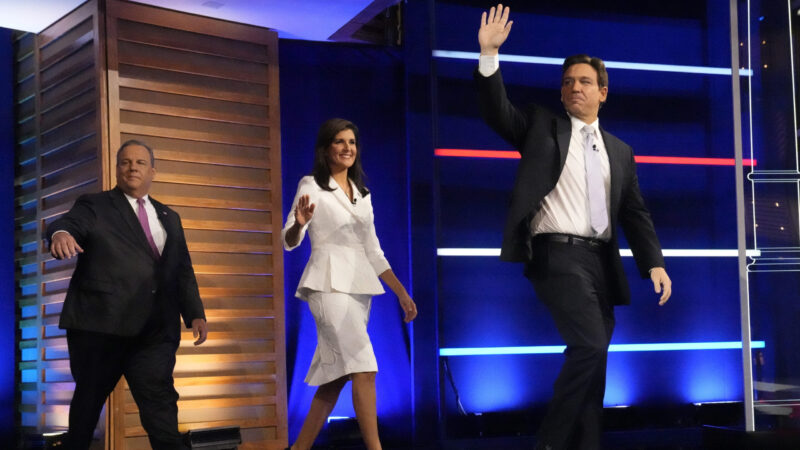A narrowing Republican presidential field will debate in Tuscaloosa Wednesday
Republican presidential candidates from left, former New Jersey Gov. Chris Christie, former UN Ambassador Nikki Haley, and Florida Gov. Ron DeSantis, arrive on stage before a Republican presidential primary debate hosted by NBC News Wednesday, Nov. 8, 2023, at the Adrienne Arsht Center for the Performing Arts of Miami-Dade County in Miami. A two-hour Republican presidential primary debate will start at 8 p.m. ET on Wednesday, Dec. 6, in Tuscaloosa, Ala.
By Bill Barrow and Jonathan Cooper
TUSCALOOSA, Ala. (AP) — The shrinking field of Republican presidential hopefuls will gather on a debate stage Wednesday for the fourth time this year, running out of time to shake up a race that’s been dominated by former President Donald Trump.
Four candidates will be on stage at the University of Alabama for their last scheduled meeting before the Iowa caucuses kick off the presidential nominating season next month. Trump, the race’s clear front-runner, will not be among them. Trump, who has staged public appearances to compete for attention during the three prior GOP debates, will this time spend the evening at a closed-door fundraiser in Florida.
Six weeks before voters in Iowa start making their choices, the debate offers a fresh opportunity for Florida Gov. Ron DeSantis, former United Nations Ambassador Nikki Haley, former New Jersey Gov. Chris Christie and biotech entrepreneur Vivek Ramaswamy to assert themselves as the best alternatives to Trump.
The candidates’ recent maneuvers, though, suggest they will spend more time going after each other than taking aim at Trump, and many Republican power players say there are diminishing returns in attacking the former president given his popularity among Republicans.
“It’s challenging for anybody else when Donald Trump is consolidating supporters,” Republican pollster Brent Buchanan said.
The debate may be hard to find for many prospective viewers. It will air on NewsNation, a cable network still trying to build its audience after taking over WGN America three years ago. NewsNation’s Elizabeth Vargas will moderate alongside Megyn Kelly, a former Fox News anchor who now hosts a popular podcast, and Eliana Johnson of the conservative news site Washington Free Beacon.
Haley has risen in recent polling to challenge the Florida governor’s position as the leading non-Trump contender. She’s leaned on her foreign policy experience since the Hamas attack on Israel on Oct. 7. And she recently won the support of the Koch brothers ‘ powerful political operation, which will send organizers and canvassers into early primary states on her behalf.
DeSantis, meanwhile, faces new upheaval in his political operation. A pro-DeSantis super PAC that is handling much of his campaign apparatus in Iowa parted ways with several top staffers over the weekend.
Ramaswamy has been a fiery presence in the three earlier debates. He’ll be looking to resurrect the surge in interest he saw over the summer but remains stalled in single digits in most polls.
And Christie, who barely met the requirements to participate, is the only leading contender to consistently go after Trump, needling his rivals for focusing on each other instead of the race’s front-runner. He has focused his campaign on New Hampshire, which holds its primaries eight days after the Iowa caucuses.
The field of invited candidates has shrunk in half since eight were on the stage at the first debate in Milwaukee in August as the Republican National Committee tightened the criteria to reach the stage each time. For Tuesday, candidates had to get at least 6% in multiple polls and amass 80,000 unique donors.
Former Vice President Mike Pence, South Carolina Sen. Tim Scott and North Dakota Gov. Doug Burgum have all dropped out of the race after participating in at least one debate. Former Arkansas Gov. Asa Hutchinson is continuing his campaign but failed to qualify.
The debate setting looms as another reminder of Trump’s strong position – and how he outpaced an even larger Republican field when he first ran and won in 2016. Trump swept Southern primaries from Virginia to Arkansas and Louisiana in his first campaign. And the changes in Alabama Republican politics in many ways reflect Trump’s influence over the party.
40 years after ‘Purple Rain,’ Prince’s band remembers how the movie came together
Before social media, the film Purple Rain gave audiences a peak into Prince’s musical life. Band members say the true genesis of the title song was much less combative than the version presented in the film.
Park Fire in California could continue growing exponentially, Cal Fire officer says
Cal Fire has confirmed that over a hundred structures have been damaged in the Park Fire, which grew overnight near Chico, Calif. Difficult firefighting conditions are forecast through Friday night.
Checking in with Black voters in Georgia about the election, now that Biden is out
Some voters who could be key to deciding who wins Georgia. What do they think about Vice President Harris becoming the frontrunner in the race to be the Democratic nominee?
Tahiti’s waves are a matter of ‘life and death’ for surfing Olympics
Tahiti's Teahupo'o wave has a slew of riders for the Paris 2024 Olympics. NPR finds out why it's called one of the most dangerous waves.
Researchers are revising botanical names to address troubling connotations
Since the mid-1700s, researchers have classified life with scientific names. But some of them have problematic histories and connotations. The botanical community is trying to tackle this issue.
A spectacular opening ceremony wowed a global audience despite Paris’ on-and-off rain
The Paris Olympics opening ceremony wowed Parisians, fans and most everyone who was able to catch a glimpse of thousands of athletes floating down the Seine to officially begin the Games.



